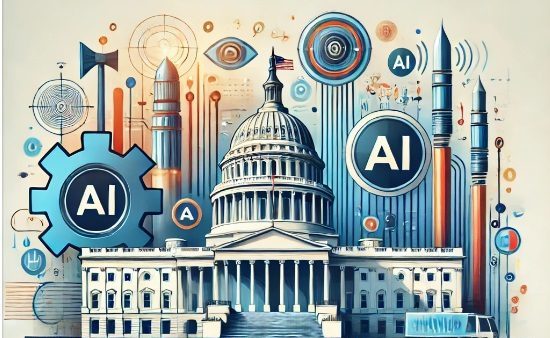Harnessing AI for Enhanced Case Management in Vocational Rehabilitation Agencies
In last week’s introductory blog, we explored the various types of artificial intelligence (AI) and their potential applications within vocational rehabilitation. In this blog, we delve deeper into a critical aspect of VR services: case management. Effective case management is the backbone of successful client outcomes in VR agencies. With the advent of AI technologies, there’s a significant opportunity to enhance these processes, leading to more efficient operations and better support for clients.
In this post, we’ll examine how AI can revolutionize case management in VR agencies by streamlining workflows, personalizing client services, and improving decision-making through data-driven insights.
How AI Transforms Case Management
AI technologies offer tools that can automate routine tasks, analyze complex data, and provide personalized recommendations. Here’s how AI enhances different aspects of case management in VR agencies:
1. Automation of Administrative Tasks
AI Tools Involved: Reactive AI, Machine Learning (ML)
- Scheduling and Reminders: AI-powered systems can automate appointment scheduling, send reminders to clients, and manage calendars, reducing no-shows and keeping clients engaged.
- Documentation and Reporting: AI can assist in generating reports, updating case notes, and managing documentation through voice recognition and natural language processing, saving counselors valuable time.
Example Application: A reactive AI system automates the scheduling of client meetings and sends personalized reminders via email or text, ensuring clients are informed and prepared for each session.
2. Personalized Client Services
AI Tools Involved: Limited Memory AI, Natural Language Processing (NLP), Generative AI
- Customized Service Plans: By analyzing client data, AI can help develop tailored rehabilitation plans that consider individual strengths, preferences, and goals.
- Virtual Assistants: NLP-enabled chatbots can provide clients with 24/7 support, answering questions, providing resources, and assisting with tasks like form completion.
Example Application: A VR agency employs an AI virtual assistant that interacts with clients to assess their needs and preferences, helping to create a personalized employment plan.
3. Data-Driven Decision Making
AI Tools Involved: Machine Learning (ML), Limited Memory AI
- Predictive Analytics: AI can analyze historical data to identify patterns and predict outcomes, helping counselors make informed decisions about service provision.
- Outcome Tracking: ML algorithms monitor client progress and flag potential issues, allowing for timely interventions.
Example Application: An ML system predicts which clients might face challenges in job placements based on various risk factors, enabling counselors to provide additional support proactively.
4. Enhanced Communication and Collaboration
AI Tools Involved: Natural Language Processing (NLP), Theory of Mind AI (future potential)
- Language Translation and Accessibility: AI can translate communications into multiple languages or provide text-to-speech services, making interactions more accessible.
- Emotionally Intelligent Interactions: While still emerging, Theory of Mind AI could one day help in understanding client emotions, leading to more empathetic communication.
Example Application: NLP-powered tools transcribe and translate counseling sessions in real-time, ensuring clear communication between counselors and clients who speak different languages.
Practical Steps for Implementing AI in Case Management
Assessment of Needs
Begin by identifying the areas within your case management process that could benefit most from AI integration. Consider tasks that are repetitive, time-consuming, or prone to human error.
Choosing the Right AI Tools
Select AI technologies that align with your agency’s goals and capabilities. This could range from simple automation software to more advanced ML systems, depending on your needs and resources.
Staff Training and Engagement
Ensure that your team is trained on the new AI tools and understands how they enhance their work. Encourage feedback and collaboration to refine AI implementations.
Data Security and Ethical Considerations
Implement robust data security measures to protect sensitive client information. Be transparent with clients about how their data is used and ensure compliance with all relevant regulations.
Benefits for Job Seekers
AI-enhanced case management doesn’t just benefit VR agencies; it significantly improves the experience for job seekers with disabilities:
- Faster Service Delivery: Automation reduces wait times for appointments and services.
- Personalized Support: AI provides recommendations and resources tailored to individual needs.
- Improved Accessibility: AI tools can make interactions more accessible through assistive technologies.
Example: A job seeker receives personalized job recommendations and resources through an AI-powered app that learns from their interactions and feedback
Libera’s AI Approach to Case Management in VR
Libera’s AI capabilities are purposefully designed to support VR agencies in delivering effective, timely, and personalized services. Let’s dive into some of the ways Libera is thinking about AI to make case management more efficient and impactful:
1. Real-Time Action Alerts
- How It Works: Libera’s AI engine monitors case data to identify when specific conditions are met, automatically notifying users of potential issues.
- Impact on Case Management: By flagging cases that require immediate attention, counselors can provide timely interventions, ensuring clients stay on track without missing critical milestones.
2. RSA Compliance Monitoring
- How It Works: Our AI monitors RSA 911 reports to ensure they comply with regulatory standards, saving agencies time and reducing compliance risks.
- Impact on Case Management: By automating compliance checks, case managers can focus on client engagement rather than administrative tasks, minimizing errors and enhancing overall data accuracy.
3. Smart-Search Capabilities
- How It Works: AI-powered Smart-Search allows counselors to quickly locate relevant cases, documents, or client information with precision and speed.
- Impact on Case Management: This feature simplifies record retrieval, enabling counselors to spend more time supporting clients and less time searching through documentation.
4. Predictive Analytics for Client Success
- How It Works: Our AI leverages data to predict the services most likely to drive successful outcomes based on historical trends.
- Impact on Case Management: Predictive analytics allows VR agencies to make informed decisions, proactively recommending the best paths for each client based on what has proven effective in similar cases.
5. Automated Document Processing
- How It Works: Libera’s AI can extract data from intake forms and reports, automatically populating case management systems and reducing manual data entry.
- Impact on Case Management: This feature cuts down on administrative workload and improves data accuracy, allowing counselors to focus on high-value tasks.
6. Anomaly Detection for Quality Control
- How It Works: Our AI detects data outliers, alerting agencies to irregularities before they escalate into larger issues.
- Impact on Case Management: Anomaly detection enhances data accuracy, helping agencies maintain a high standard of service quality while swiftly addressing discrepancies.
Looking Ahead: The Future of AI in VR
Libera is committed to pushing the boundaries of AI, with a roadmap that envisions more advanced capabilities to support VR agencies. Our upcoming features include:
- Enhanced Natural Language Processing (NLP): We’re expanding NLP functionalities to enable seamless, intuitive interactions, allowing users to engage with data and case files through voice commands.
- Automated Case Assignment: AI will soon match counselors with cases based on complexity and workload, optimizing case allocation for efficiency and balanced workloads.
- Case Note Prediction: Streamlined AI-driven case notes will ensure accurate documentation while saving time for counselors.
Conclusion: The Role of AI in VR
AI has the power to transform case management in vocational rehabilitation agencies by automating routine tasks, personalizing client services, and enhancing decision-making processes. By embracing these technologies, VR agencies can improve efficiency, reduce administrative burdens, and, most importantly, provide better support to individuals seeking meaningful employment.
Stay tuned for our next discussion, where we’ll explore Implementing AI Ethically in VR Agencies: Best Practices and Considerations, focusing on how to integrate AI technologies responsibly while safeguarding client privacy and promoting equitable access to services.
Want to learn more? Join us for a 30-minute webinar, Unlocking the Power of AI: Discover the Future of Vocational Rehabilitation Agencies.
Join us for a 30-minute webinar on Friday, January 17th, 2025 at 1:00 PM ET! Libera’s AI experts will explore ways to streamline workflows, enhance client outcomes, and future-proof your agency. Register below.





